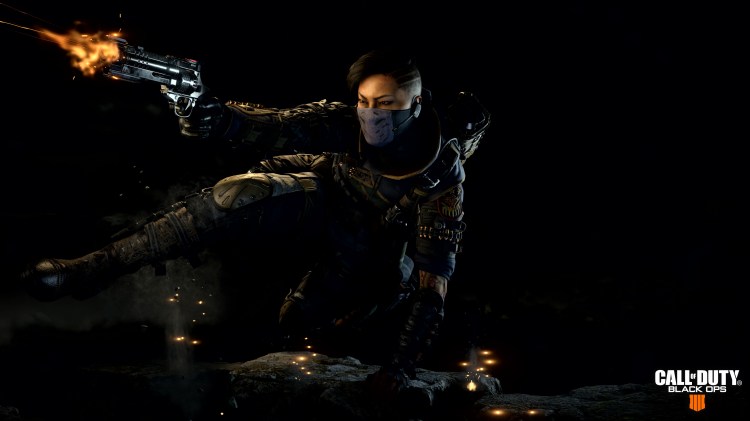Rob Kostich manages the Call of Duty franchise at Activision Publishing. And this year, that means he is overseeing Treyarch, the studio that is making this year’s multiplayer-only Call of Duty: Black Ops 4.
I’m not a big fan of the decision to ditch the single-player campaign in this year’s title, but I sat down with Kostich yesterday to get Activision’s perspective on the evolving franchise. He said that the team is making decisions and taking risks based on what will be fun for fans and the larger community.
We’ll find out if the studio made the right calls — to dump single player and to add a battle royale mode — on October 12, when the game debuts on the Xbox One, PlayStation 4, and PC. Kostich explained to me his perspective and the studio’s perspective on why it broke with the past and took a new road, which included tripling down on its Call of Duty Zombies experience.
I hope it all works out. But I’m worried. Here’s an edited transcript of our conversation.
June 5th: The AI Audit in NYC
Join us next week in NYC to engage with top executive leaders, delving into strategies for auditing AI models to ensure fairness, optimal performance, and ethical compliance across diverse organizations. Secure your attendance for this exclusive invite-only event.
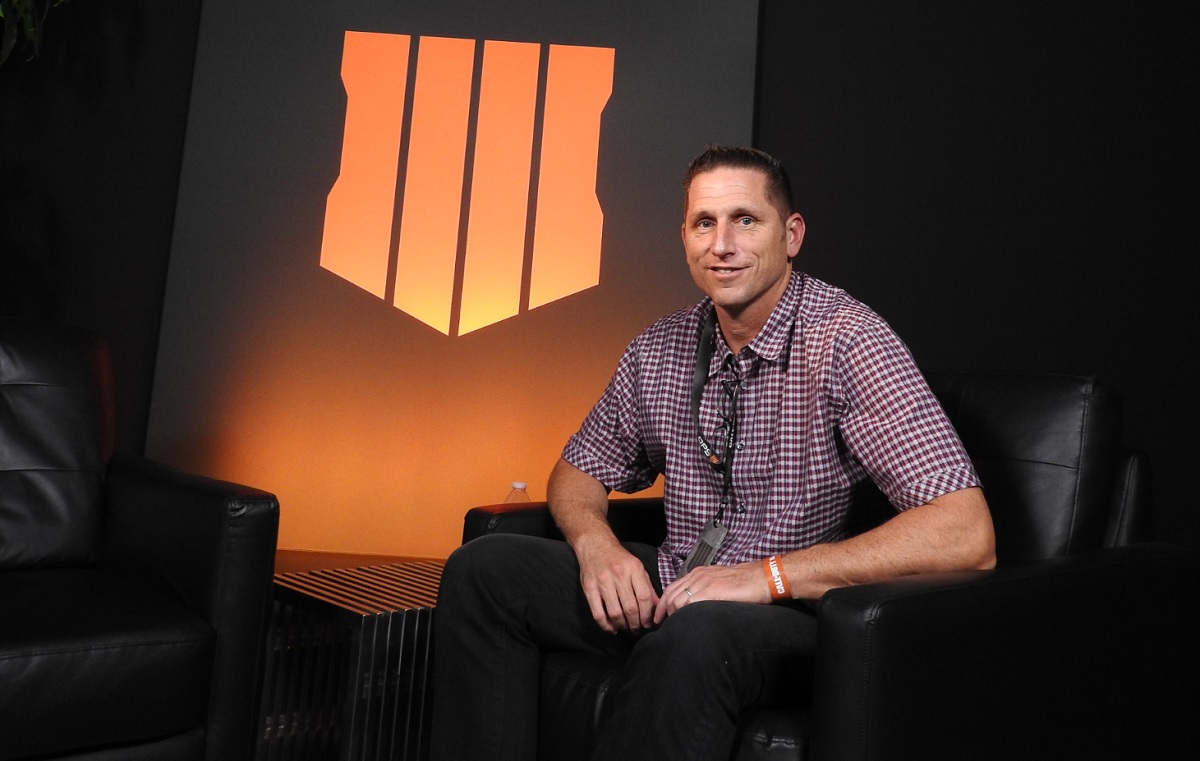
Above: Rob Kostich, executive vice president and general manager of Call of Duty.
GamesBeat: The burning question for me is single-player. Can you provide more context for not doing it this time?
Rob Kostitch: For not including it? One thing that — if you want to go all the way back to Black Ops III, even the campaign in Black Ops III was designed around cooperative and bringing people together. That was one of the design principles. From the beginning of development here, Treyarch has been very focused on bringing friends together to have fun in new ways. From the earliest parts of development, we’ve been prototyping a lot of new things to do that. As you saw during the presentation today, certainly some of those new ideas have now manifested in our new mode, which is called Blackout.
Beyond that, I would say that our commitment to story is still there, but just in different ways. For us, in terms of multiplayer now, building out the multiplayer universe we thought was a really great opportunity for us. This is a mode that people play for months and years on end. Giving people a better way to connect to this universe made a lot of sense, having backstory there. When you play the solo experience within multiplayer, it’s going to teach you how to play those characters and understand their abilities really well. It’ll also give you a lot of their backstory, so you’ll have a better connection to them than you’ve ever had.
GamesBeat: I kind of buy that, but I don’t buy all of it. It seems like single-player, in some ways, is the thing that engages me the most. I care about the characters in multiplayer because I’ve seen the context around them. The idea of arch-villains or buddy characters or whatever, those are very emotionally memorable. That part seems like a hard thing to let go. I don’t know how you guys let go of it.
Kostich: From a franchise perspective, certainly Black Ops is doing something very new this year, something we’re very excited about. We think the community is going to be able to play it for a long time and have a lot of fun with it.
Across the franchise, though, what I really like about what we’re doing now is we have a strong set of differentiated experiences. While this game doesn’t have a dedicated campaign, that doesn’t mean that others won’t.
GamesBeat: Does the concept of a trade-off come in here at some point? Did you make some hard decisions? If you’re going to include something late-breaking like Blackout, something else had to give?
Kostich: Development is always a journey. We’re always exploring and prototyping things along the way. As we got through the middle of development, this really started to come to be for us, and we thought about the opportunity ahead for people to enjoy this game for a long period of time. The studio is very passionate about doing something different this year. We felt we had a great plan.
Even in terms of last year, we learned a lot. We released Zombie Chronicles and the response to that alone within Black Ops III, for all that extra Zombies content, was fantastic, beyond our expectations. That’s why you also start to see more Zombies content on day one in this game, more than we’ve ever done before. We’re trying to listen to the community and provide them with the experiences they like, and we’re also trying some new things.
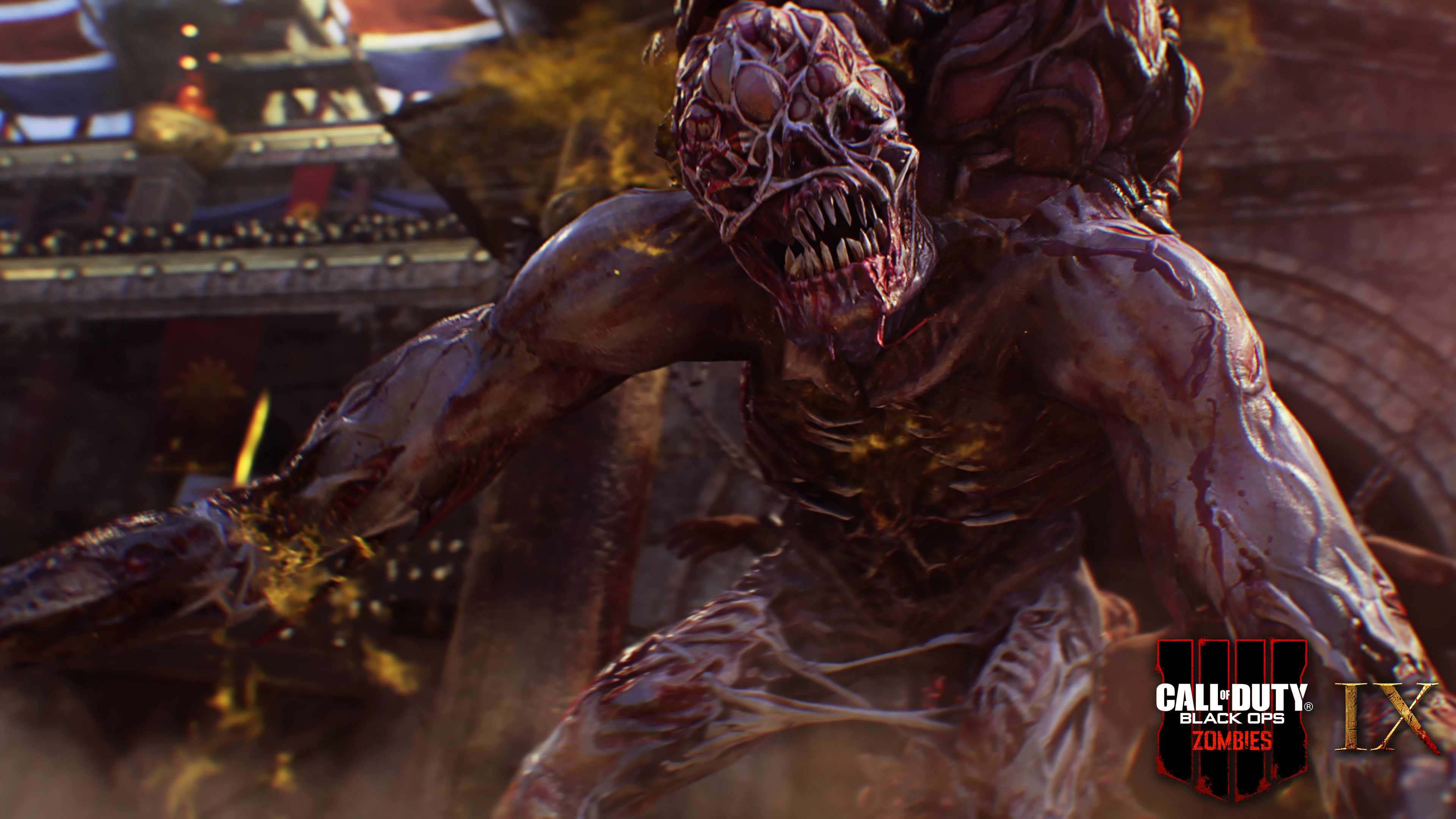
Above: Call of Duty: Black Ops 4 Zombies.
GamesBeat: Did it become evident over time to you, what’s most popular in the community? Multiplayer seems to have grown in popularity and Zombies has grown in popularity. Single-player has maybe been at the bottom of the stack.
Kostich: I wouldn’t say it’s at the bottom at all. In fact, we’re as passionate about some of these dedicated campaigns as anyone is. We’ve been making them forever. We’ll continue make some of these as we move into the future as well. Black Ops was just unique. We felt we had a unique opportunity to do something different for the community, and so we embraced it. We think we’ll have a great experience for the fans.
GamesBeat: The fundamental structure, does it still seem like the way you want to keep doing things? One game every three years at each studio?
Kostitch: That’s certainly the plan right now. We’ve been doing this for a long time with a Call of Duty every fall. Every year the level of engagement we get with the new content is significant. It’s what the community is responding to. We want to give them the best set of experiences we possibly can.
 GamesBeat: As far as Black Ops, it’s special in that it’s the most popular version, right? What did you identify as the things that make it so popular, compared to some of the other Call of Duty games?
GamesBeat: As far as Black Ops, it’s special in that it’s the most popular version, right? What did you identify as the things that make it so popular, compared to some of the other Call of Duty games?
Kostich: A lot of the long-term success of the Black Ops series has been—most unique to Black Ops is the engagement with multiplayer and Zombies. Treyarch has done a great job across that front. We see the community playing Black Ops games in particular for really long periods of time. We want to give the community more content there for those kinds of experiences than we ever had. Again, that’s what the team was really passionate about.
In terms of Blackout, it was really important for us to do something we feel is going to be unique in this space, bring things to bear that only we can bring. That’s an interesting way for people who’ve been fans of this series to bring that universe all together into one place and have fun in different ways.
GamesBeat: Some of the Zombies thing reminded me of that hoax story about Call of Duty Rome or whatever it was. Did that have any bearing on why to do it that way?
Kostich: You’d have to ask Jason for the motivation and inspiration behind that. But Zombies has been a real crazy journey, if you think about it. It spans so many crazy ideas. Somehow the team finds a way to connect it all together. This is a new narrative, and we’re also giving fans something remembered with the Blood of the Dead thing. The Zombies community is going to be really happy with the breadth of content here.
GamesBeat: I missed something there, I think. Why did they cheer for Blood of the Dead?
Kostich: In Blood of the Dead–one of the favorite maps we’ve ever had in our history is called Mob of the Dead. This is a different spin on it, where the Origins cast from Black Ops III is inserted into that map. We’ve done some new stuff with the map as well. That’s the thing our community has been crying out the loudest for, to see us remaster that. We’ve taken a different spin on it. The real hardcore Zombies guys are super excited about that.
GamesBeat: It seems like an interesting change, to go from a small number of players to something so large in Blackout. How big a change is that for this game, to accommodate that? It’s always been six on six, even in War mode from WWII.
Kostich: We did Ground War in the past, which was nine on nine. But yeah, Blackout is an order of magnitude different for us in every way, from player count to map size. It’s 1,500 times bigger than Nuketown. It’s doing things very differently than anything we’ve ever done. It’s pushed the team in new ways, which is exciting. It’s through these things that we uncover new places Call of Duty can go in the future and try different things for the community, let them have fun in different ways.
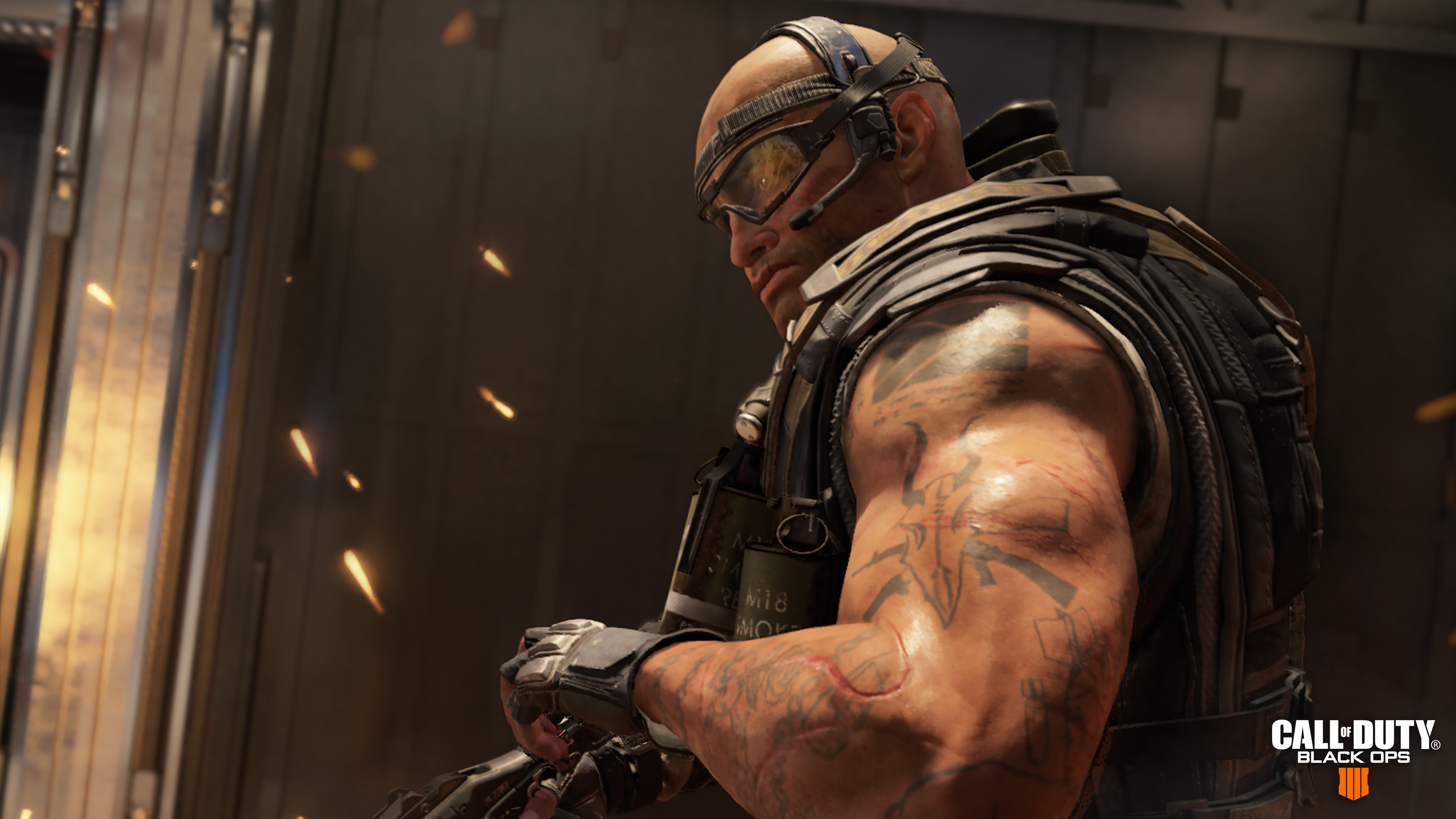
Above: Ajax in Call of Duty: Black Ops 4.
GamesBeat: Zombies has always been a creative outlet. If you kept some other things the same, you could always go crazy in Zombies, veer off into completely foreign territory.
Kostich: Zombies may have the most creative freedom out of anything we do. It’s the most pliable, I’d say.
GamesBeat: Are you making the rest more pliable now, then?
Kostich: No. If you think about multiplayer, it’s a very gritty, grounded experience, much more so than Black Ops III. That remains very true to Call of Duty in every way. Blackout is really a celebration that brings together our universes from all four games into one place. That’ll be grounded in a different way, in our history.
GamesBeat: Esports is hot these days. Did that enter the picture as far as how to design some of this multiplayer?
Kostich: First and foremost, we want to make sure people who just like to play online have fun with it. But the game does provide, I think, a new level of tactical depth, which will be great for esports. But the design goal is always to make sure it’s fun for everyone to jump online and play lone wolf if that’s what they want to do, or to play as a team. There’s a lot of stuff today where I think the team aspect will shine through more than ever, like communication, which I think will translate really well to the esports scene.
GamesBeat: It does seem that some of the—the importance of both insane skill and luck has been reduced here, I think. Grenades were always a lucky throw sort of thing. You’d spawn in Nuketown and instantly throw a grenade. Now you just can’t do that.
Kostitch: It’s always that fine balance, which the team is always trying to maintain. We want to reward skill and make it fun for everyone. They’re always exploring that line. I think we do a pretty good job of finding a good balance.
GamesBeat: Fortnite seems to have done better than PUBG because it’s more mass-market, more approachable. More light-hearted, maybe? I wonder if Blackout, in some ways, could be more appealing to a mass audience, and in some ways not.
Kostich: I think the benefit we have is that we have that history, from the entire Black Ops series. That’s going to bring a lot of variability to the experience and make it fun. We want to stay true to Black Ops, to where it’s been and what that means, but that alone is going to make it really interesting – the combination, who’s who, and what’s happening on the screen at any moment in time.
GamesBeat: One map doesn’t sound like as big an effort as maybe the Zombies side of things. Are there more maps coming for Blackout?
Kostitch: Most of these games now are largely played on one map. Fortnite is largely played on one map. We’re very focused on that, making sure this initial experience is everything it needs to be to make it awesome. Then we’ll see from there as far as what the opportunities for the mode are as we go forward.
GamesBeat: How about Zombies getting the Blackout treatment?
Kostitch: [laughs] You know, it might. Obviously today we’re just talking about what you saw.
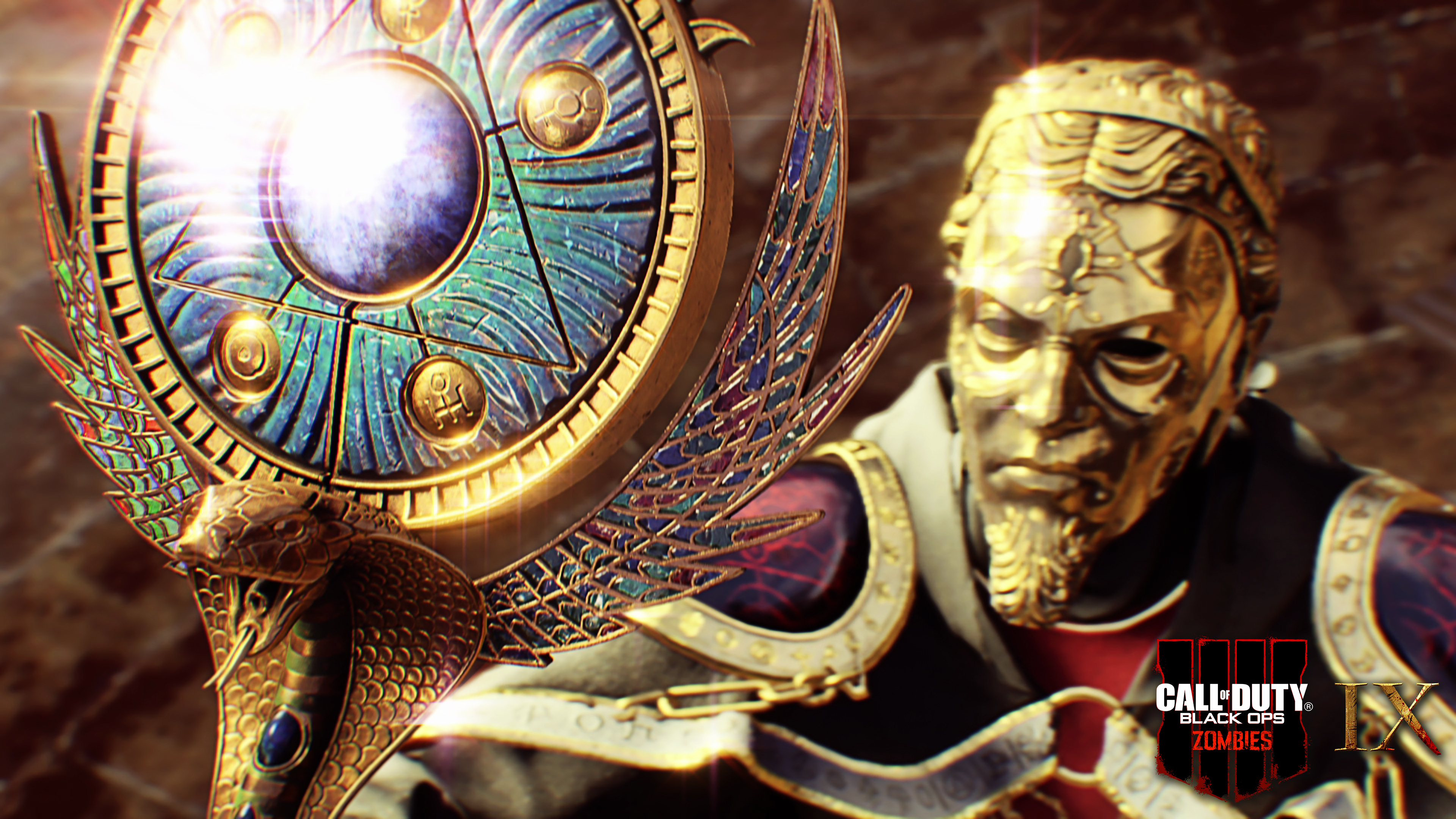
Above: Call of Duty: Black Ops 4 Zombies.
GamesBeat: Fortnite has zombies, after all.
Kostich: Well, we talked about our Zombies characters being involved in this. I think there will be some interesting things happening in this mode over time.
GamesBeat: Why did moving to battle.net make sense for you this time?
Kostich: You may have heard a bit of it on the video. Back in the early days, we partnered with Blizzard when they were making Overwatch. They learned a lot from Treyarch in terms of shooter mechanics. It was natural for us to work with them. They have so much knowledge and history with the PC platform. Bringing our development chops along with what they do on the platform, and partnering with Beenox as well—we just wanted to provide a new level of commitment to the platform. We’re doing that this year in a big way.

Above: Dan Bunting and David Vonderhaar at Black Ops 4 reveal.
GamesBeat: Is it more about social communication features than just who has a lot of servers lined up?
Kostich: It’s all important: the social systems, the security systems, how we think about the dedicated server setup, everything for the PC platform. We’re combining best practices across the board to provide a better experience. Destiny did a great job with it last year and we’re looking forward to doing a great job with Call of Duty this year.
GamesBeat: That seems like a change as well. There didn’t seem to be as much cooperation across the Blizzard-Activision lines before.
Kostich: There was always cooperation. It’s funny. At the development level people are always talking. We’re always exchanging ideas. It happens organically. Now you’re just seeing this happen a bit more formally. We’re launching things on battle.net, for example. But that partnership has been great. They’re a great team over there and we love working with them.
GamesBeat: There’s been a lot more executive change than usual for Activision and Activision Blizzard lately. Has anything changed as far as how you guys operate?
Kostich: I don’t know if it’s necessarily been more than normal. On the Call of Duty team, I’ve been doing this almost 10 years now. We have a lot of stability on the Call of Duty team. We’ve been doing our thing. We’re still operating like we always have. It hasn’t really affected us at all.
Eric Hirshberg has been an awesome guy for me to work with over the years. He had an incredibly successful run as our CEO at Activision Publishing. But he left us in a great place. We’re in a great place moving forward and we have great plans ahead of us.
GamesBeat: Do you have another Call of Duty XP in mind?
Kostich: We’ll see. We’re focused on this event today right now. [laughs]
